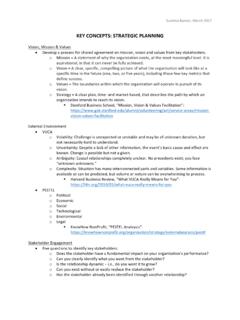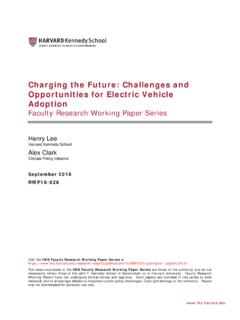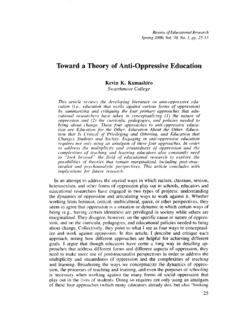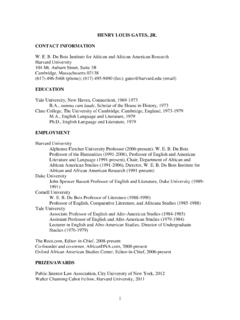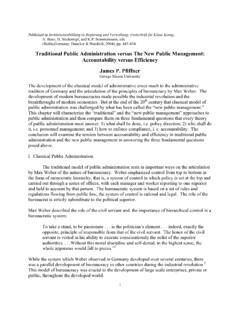Transcription of Is capitalism compatible with democracy? - Harvard University
1 Essay1 3 Prof. Dr. W. Merkel ( )Abteilung Demokratie und Demokratisierung, Wissenschaftszentrum Berlin f r Sozialforschung WZB,Reichpietschufer 50,10785 Berlin, Deutschlande-mail: capitalism compatible with democracy ?Wolfgang MerkelZ Vgl Polit WissDOI capitalism and democracy follow different logics: unequally distributed property rights on the one hand, equal civic and political rights on the other; profit-oriented trade within capitalism in contrast to the search for the common good within democracy ; debate, compromise and majority decision-making within demo-cratic politics versus hierarchical decision-making by managers and capital owners. capitalism is not democratic, democracy not the first postwar decades, tensions between the two were moderated through the socio-political embedding of capitalism by an interventionist tax and welfare state. Yet, the financialization of capitalism since the 1980s has broken the precarious capitalist-democratic compromise.
2 Socioeconomic inequality has risen continuously and has transformed directly into political inequality. The lower third of developed societies has retreated silently from political participation; thus its preferences are less represented in parliament and government. Deregulated and globalized markets have seriously inhibited the ability of democratic governments to govern. If these challenges are not met with democratic and economic reforms, democracy may slowly transform into an oligarchy, formally legitimized by gen-eral elections. It is not the crisis of capitalism that challenges democracy , but its neoliberal triumph. Springer Fachmedien Wiesbaden 20142 W. Merkel1 3 Keywords capitalism Neoliberalism democracy Rising inequality Disembedding of capitalism Financialization Oligarchic trends Marginalization of the lower strataSind Kapitalismus und Demokratie miteinander vereinbar?
3 Zusammenfassung Kapitalismus und Demokratie folgen unterschiedlichen Logi-ken. Ersterer basiert auf Eigentumsrechten, individueller Gewinnmaximierung, hie-rarchischen Entscheidungsstrukturen und ungleichen Besitzverh ltnissen, Letztere gr ndet auf der Suche nach Allgemeinwohl, Diskurs, politischer Gleichheit und den Verfahren konsensueller oder majorit rer Entscheidungsfindung. Kapitalismus ist nicht demokratisch und Demokratie nicht hrend der ersten Nachkriegsjahrzehnte wurden die Spannungen zwischen Kapitalismus und Demokratie durch einen interventionistischen Steuer- und Wohl-fahrtsstaat in Grenzen gehalten. Die Finanzialisierung des Kapitalismus seit den sp ten 1980er Jahren hat den prek ren Kompromiss zerbrochen. Die kontinuier-lich zunehmende sozio konomische Ungleichheit bersetzt sich direkt in politi-sche Ungleichheit. Das untere Drittel der Gesellschaft steigt schweigend aus der politischen Partizipation aus.
4 Gleichzeitig haben Deregulierung und Globalisierung die Handlungsm glichkeiten demokratischer Regierungen erheblich eingeschr nkt. Dies sind gravierende Herausforderungen der Demokratie. Werden sie nicht ernst genommen und wird ihnen nicht mit wirtschaftlichen und politischen Reformen begegnet, werden sich die oligarchischen Tendenzen in Wirtschaft und Demokratie tiefer eingraben. Es ist nicht die Krise, sondern der Triumph des Kapitalismus, der die Demokratie in Bedr ngnis gebracht sselw rter Kapitalismus Neoliberalismus Demokratie Wachsende Ungleichheit Entbettung des Kapitalismus Finanzialisierung Oligarchisierung Marginalisierung der unteren Schichten1 IntroductionThroughout the past two centuries, capitalism and democracy have proven them-selves the most successful systems of economic and political Following the demise of Soviet-style socialism after 1989 and the transformations of China s econ-omy, capitalism has become the predominant system around the world.
5 Only a few isolated countries such as North Korea have been able to resist the success of capi-talism through the use of brutal force. The market has become the main mechanism for economic coordination and the maximization of profits. The global competition 1 The article is a modified version of a co-authored text by J rgen Kocka and Wolfgang Merkel: Kapital-ismus und Demokratie forthcoming in: Merkel, Wolfgang (ed.) Ist die Krise der Demokratie eine Erfind-ung? (Merkel 2014). I am very grateful to J. Kocka, however, all remaining weaknesses or shortcomings of this text are my capitalism compatible with democracy ? 31 3of economic systems has been clearly won. Yet capitalism , used in singular form, conceals the differences in the varieties of capitalism (Hall and Soskice 2001).2 China s state capitalism , the Anglo-Saxon neoliberal strand of capitalism or the Scan-dinavian welfare state economies differ substantially from one another.
6 They func-tion or malfunction rather differently in conjunction with democratic success of democracy in the last quarter of the twentieth century was impres-sive. However, democracy s success pales in comparison to the spread of capitalism throughout the world. If we take the minimal standards of democracy as a measure-ment, there were 123 countries (out of around 200) that could be called an electoral democracy in 2010 (Freedom House 2010). If the much more stringent concept of a liberal democracy is applied, only 60 countries can be classified as liberal rule of law-based democracies (Merkel 2010). Yet, both electoral and liberal democracies coex-ist with capitalist economies. Historical evidence also confirms that no developed democracy could exist without capitalism . Vice versa this is not the case. National Socialist Germany, the People s Republic of China, Singapore and the capitalist dictatorships of Latin America or Asia in the twentieth century all exemplify that capitalism can coexist or even flourish in the context of different forms of political government, such as democracy and impressive advancement of democracy around the world coincides with the often-cited malaise of the established democracies.
7 Since the turn of the millennium, an ever increasing number of theories and analyses define mature democracies along the lines of diminished subtypes of democracy (Offe 2003), post-democracies (Crouch 2004), defective democracies (Merkel 2004) or mere fa ades (Streeck 2013a, p. 241). capitalism is primarily blamed for this development. Financial capi-talism in particular raises inequalities in income and political participation, curbs the powers of parliaments and seriously constrains the capacity to govern from national executives. The latest financial crisis of 2008 and the subsequent Euro crisis have changed the thinking about the complementary nature of capitalism and democracy . Theoretical as well as empirical analyses are showing an increasing number of con-tradictions even incompatibilities between capitalism and democracy . Albeit with new arguments and insights, the debate contains some theoretical links to the leftist debate in the early 1970s about the legitimacy crisis of the late capitalist state (Offe 1972; Habermas 1973; O Connor 1973).
8 How deeply seated are the incompatibilities of varieties of capitalism with dif-ferent varieties of democracy ? To what extent has capitalism , in its different variet-ies, become a challenge for democracy and its normative standards? In our approach capitalism is the challenger, the independent variable, while democracy functions as the dependent variable. Yet, this independent variable is in a constant process of change, conditioned by political, social and economic influences. Our argument is structured as follows:2 Hall and Soskice, however, only describe two varieties of capitalism that they see represented in the context of the OECD: liberal market economies und coordinated market economies. New hybrid types of Manchester-like state capitalism in China, gangster capitalism in Russia and Ukraine during the 1990s, and crony capitalism in South East Asia are not taken into consideration here, since they have emerged outside the context of the W.
9 Merkel1 3 Presenting the main features of capitalism and democracy ; Discussing the basic different logics of the two regimes; Showing the (in-)compatibility of specific varieties of the two regimes; Presenting the specifics of current financial capitalism ; Analyzing the challenges posed by financial capitalism to embedded democracies. 2 Three types of capitalismThe main difference in various types of capitalism is the relationship between the market and the state. Three types of capitalism can be identified as having prevailed during different periods of time over the last two centuries. They are historical types but can also be read as ideal types since the number of defining elements is reduced to the most important ones and the concrete properties of those single characteristics are described in a stylized capitalism : Coined by the prevailing market principles in the rela-tionship between different companies, this type was dominant in Europe and North America throughout much of the nineteenth century.
10 State institutions in this context largely refrained from interfering in markets (including labor markets), and economic and social policy (Berend and Schubert 2007). Taxes and expenditures were low; the welfare state had emerged only in an embryonic and embedded capitalism : Within the context of technological and orga-nizational innovations, capitalism developed internal needs for coordination and reg-ulation. Moreover, a barely regulated form of capitalism resulted in increasing social tensions. Together, these two factors were the driving force behind a more organized form of capitalism . This became visible on several fronts: Large businesses began to find ways of cooperating that limited competition (such as cartels, mergers and associations), and ways to identify and represent common interest. Furthermore, the state began to interfere increasingly in the economy and society by implementing labor laws, selective subsidies, nationalization and increasing regulation, but also by creating the welfare state and expanding its social policy in Germany already in place since the 1880s (Winkler 1974; Lash and Urry 1987).



